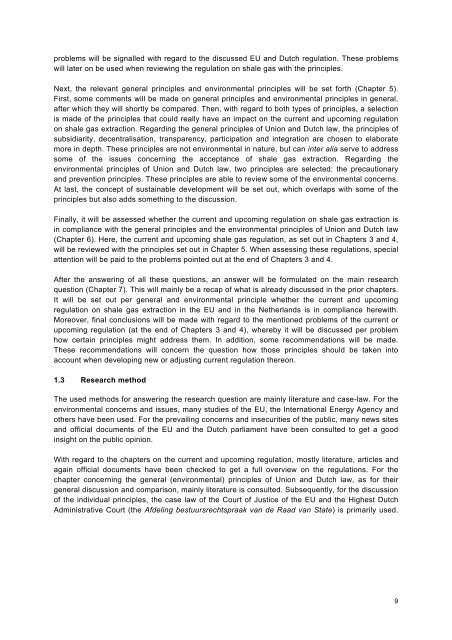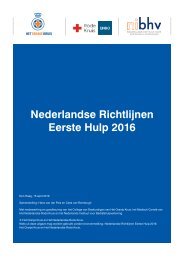Thesis-Anne-Vos-Masters-SBR-and-EU-Law-3
Thesis-Anne-Vos-Masters-SBR-and-EU-Law-3
Thesis-Anne-Vos-Masters-SBR-and-EU-Law-3
You also want an ePaper? Increase the reach of your titles
YUMPU automatically turns print PDFs into web optimized ePapers that Google loves.
problems will be signalled with regard to the discussed <strong>EU</strong> <strong>and</strong> Dutch regulation. These problems<br />
will later on be used when reviewing the regulation on shale gas with the principles.<br />
Next, the relevant general principles <strong>and</strong> environmental principles will be set forth (Chapter 5).<br />
First, some comments will be made on general principles <strong>and</strong> environmental principles in general,<br />
after which they will shortly be compared. Then, with regard to both types of principles, a selection<br />
is made of the principles that could really have an impact on the current <strong>and</strong> upcoming regulation<br />
on shale gas extraction. Regarding the general principles of Union <strong>and</strong> Dutch law, the principles of<br />
subsidiarity, decentralisation, transparency, participation <strong>and</strong> integration are chosen to elaborate<br />
more in depth. These principles are not environmental in nature, but can inter alia serve to address<br />
some of the issues concerning the acceptance of shale gas extraction. Regarding the<br />
environmental principles of Union <strong>and</strong> Dutch law, two principles are selected: the precautionary<br />
<strong>and</strong> prevention principles. These principles are able to review some of the environmental concerns.<br />
At last, the concept of sustainable development will be set out, which overlaps with some of the<br />
principles but also adds something to the discussion.<br />
Finally, it will be assessed whether the current <strong>and</strong> upcoming regulation on shale gas extraction is<br />
in compliance with the general principles <strong>and</strong> the environmental principles of Union <strong>and</strong> Dutch law<br />
(Chapter 6). Here, the current <strong>and</strong> upcoming shale gas regulation, as set out in Chapters 3 <strong>and</strong> 4,<br />
will be reviewed with the principles set out in Chapter 5. When assessing these regulations, special<br />
attention will be paid to the problems pointed out at the end of Chapters 3 <strong>and</strong> 4.<br />
After the answering of all these questions, an answer will be formulated on the main research<br />
question (Chapter 7). This will mainly be a recap of what is already discussed in the prior chapters.<br />
It will be set out per general <strong>and</strong> environmental principle whether the current <strong>and</strong> upcoming<br />
regulation on shale gas extraction in the <strong>EU</strong> <strong>and</strong> in the Netherl<strong>and</strong>s is in compliance herewith.<br />
Moreover, final conclusions will be made with regard to the mentioned problems of the current or<br />
upcoming regulation (at the end of Chapters 3 <strong>and</strong> 4), whereby it will be discussed per problem<br />
how certain principles might address them. In addition, some recommendations will be made.<br />
These recommendations will concern the question how those principles should be taken into<br />
account when developing new or adjusting current regulation thereon.<br />
1.3 Research method<br />
The used methods for answering the research question are mainly literature <strong>and</strong> case-law. For the<br />
environmental concerns <strong>and</strong> issues, many studies of the <strong>EU</strong>, the International Energy Agency <strong>and</strong><br />
others have been used. For the prevailing concerns <strong>and</strong> insecurities of the public, many news sites<br />
<strong>and</strong> official documents of the <strong>EU</strong> <strong>and</strong> the Dutch parliament have been consulted to get a good<br />
insight on the public opinion.<br />
With regard to the chapters on the current <strong>and</strong> upcoming regulation, mostly literature, articles <strong>and</strong><br />
again official documents have been checked to get a full overview on the regulations. For the<br />
chapter concerning the general (environmental) principles of Union <strong>and</strong> Dutch law, as for their<br />
general discussion <strong>and</strong> comparison, mainly literature is consulted. Subsequently, for the discussion<br />
of the individual principles, the case law of the Court of Justice of the <strong>EU</strong> <strong>and</strong> the Highest Dutch<br />
Administrative Court (the Afdeling bestuursrechtspraak van de Raad van State) is primarily used.<br />
9



